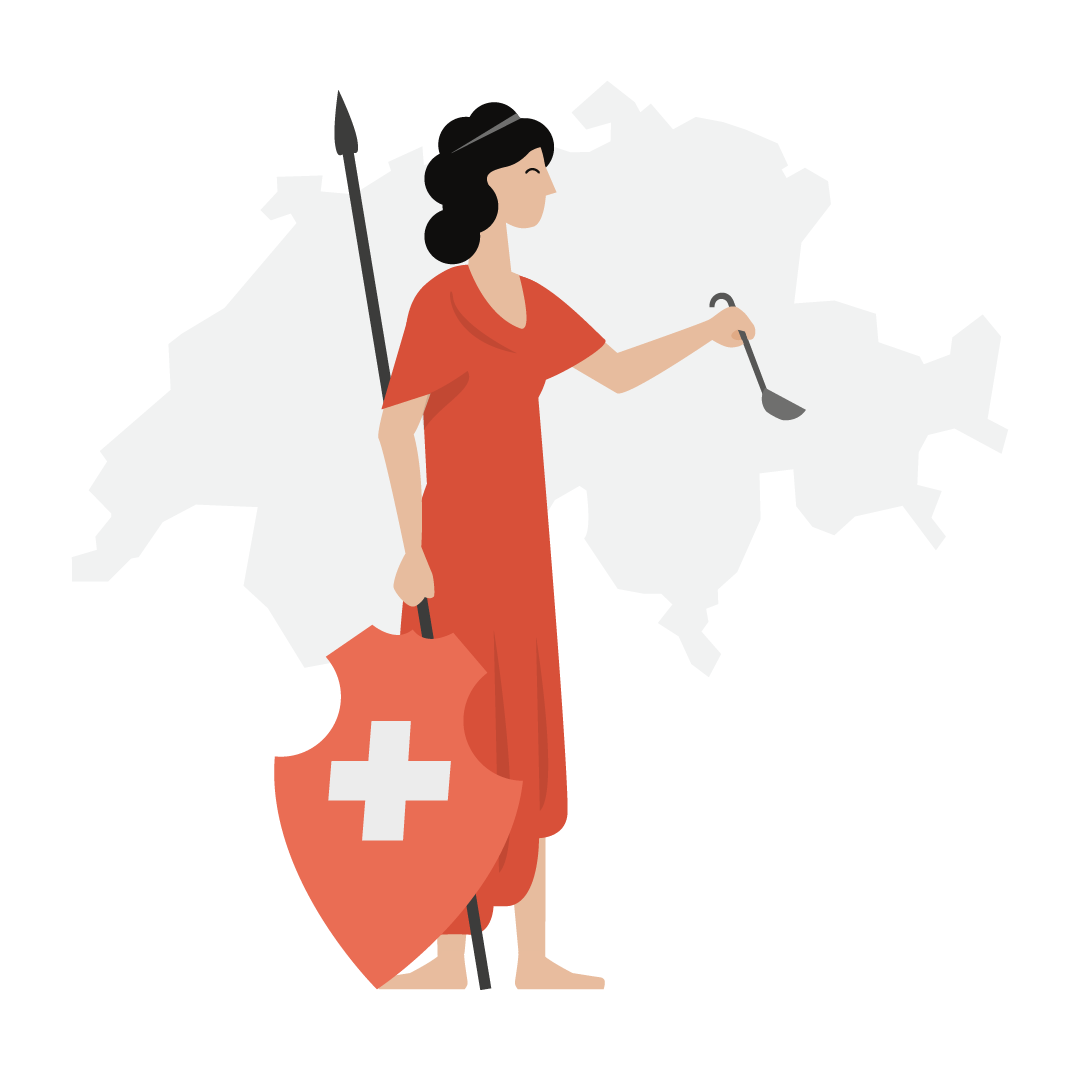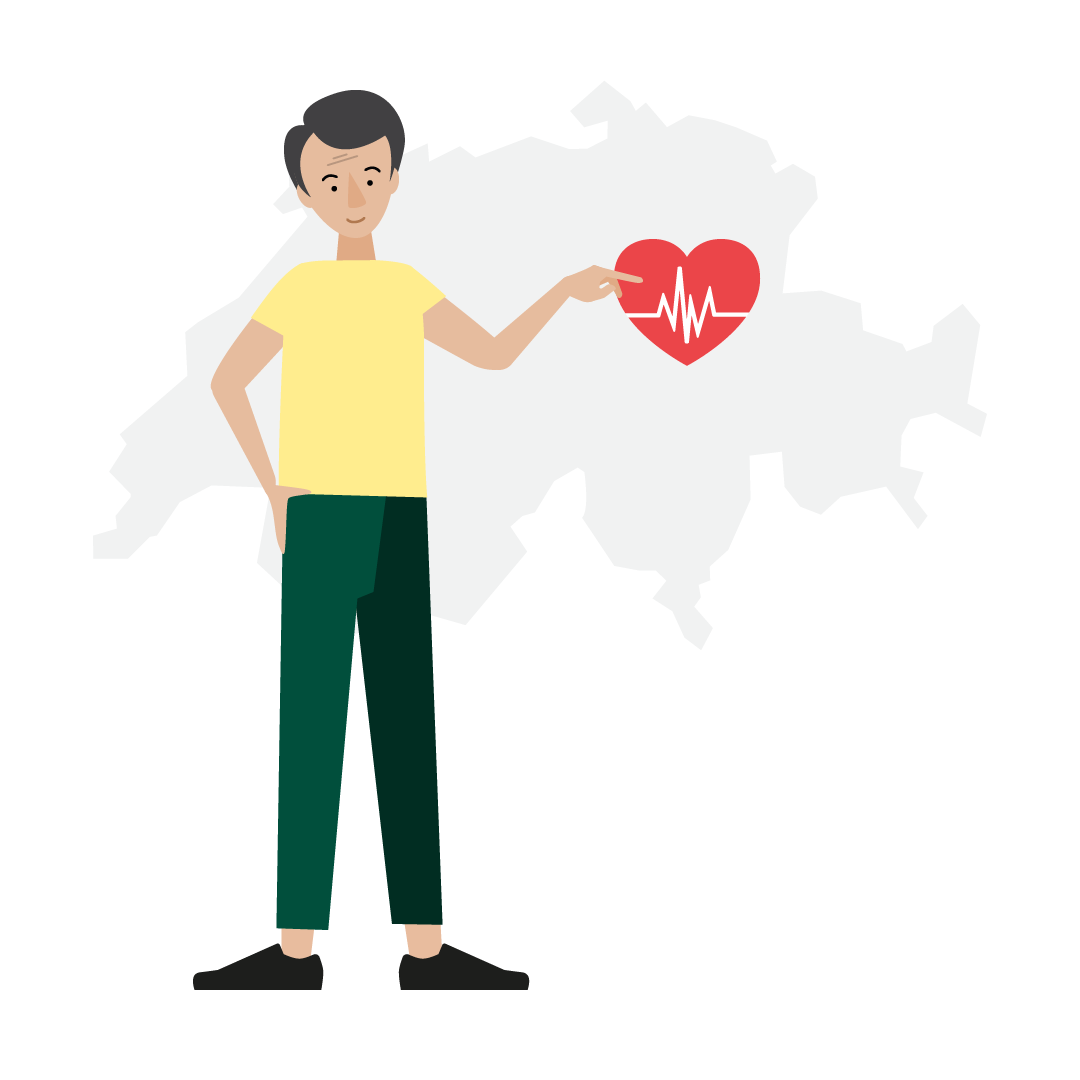
Grüezi and welcome!
What you need to know about health insurance in Switzerland
Are you planning on moving to Switzerland or just moved here recently? Find out what you need to know about being properly insured.
Compulsory health insurance requirement in Switzerland

Health insurance is mandatory in most European countries – and Switzerland is no exception. If you move to Switzerland and work here or receive a pension from Switzerland, you have to take out basic health insurance in accordance with the Swiss Health Insurance Act (KVG/HIA).
-
Who is subject to compulsory health insurance?
The insurance requirement applies to all persons who settle permanently in Switzerland. Each family member must be insured individually, adults as well as children. There is no family insurance plan. And health insurance premiums, or premiums for short, are also incurred for each individual.
-
Who is exempt from compulsory insurance?
You are exempt from the compulsory insurance requirement when …
- … you live in Switzerland but are employed in an EU/EFTA state or receive a pension exclusively from an EU/EFTA state.
- … you have been seconded to Switzerland from an EU/EFTA state for a period of up to 24 months.
- … you are a member of a diplomatic or consular mission and employee of an international organisation which enjoys privileges under international law.
- … you’ve come to Switzerland solely for the purpose of medical treatment or spa therapy.
Special conditions apply for people who live in Europe but who work or study in Switzerland.
-
When does the compulsory insurance requirement take effect?
The compulsory insurance requirement applies on the day of your arrival in Switzerland. However, you have a period of three months to take out basic insurance. If you do this after two months, for example, you will have to pay the first two months retroactively. This is because your health insurance will also retroactively cover possible costs for medical treatment for this period. It is therefore advisable to decide on health insurance as early as possible.
Create an individual quote
Mandatory health insurance, also known as basic insurance, ensures that all Swiss residents can afford a high level of comprehensive medical care. Whether in the event of illness, accident or maternity, everyone is insured to the same extent. And all 60 or so Swiss health insurers are obliged by law to cover the same benefits under basic insurance.
-
Save money with alternative models
Although benefits for basic insurance are identical, different models are available to help you save money. The only difference is who you contact first in the event of illness. The standard model is generally the most expensive, but it includes a free choice of doctors throughout Switzerland. However, if you always contact your chosen family doctor first, report your symptoms via telemedicine or contact a network of experts, you will receive a discount of up to 17% on the standard model, depending on which Sanitas insurance plan you choose.
-
What costs are covered under basic insurance?
Generally speaking, mandatory health insurance covers benefits in case of illness, accident and maternity.
For example:
- Treatments with a doctor or specialist throughout Switzerland
- Hospital treatment in the general ward of your canton of residence
- Cost share towards emergency treatment worldwide
- Medicines, laboratory tests or medical aids
In the event of accidents, however, basic insurance will only cover the costs if you have included it under your basic insurance and have no other insurance cover under a separate accident insurance policy.
-
Who is insured against accidents in Switzerland?
If you work for more than eight hours a week for the same employer, you’re automatically covered for accidents by your employer. Your employer’s contract stipulates which ward you will be treated on in hospital in the event of an accident. If you want to upgrade your insurance cover and receive treatment on the semiprivate or private ward, it’s worth taking out supplementary accident insurance.
-
Your cost share for basic insurance
The deductible is the fixed annual amount that insureds pay towards their treatment costs. For adult insureds, the minimum deductible is CHF 300. You can also choose a higher deductible – up to CHF 2,500 – and pay a lower premium.
Benefits covered under basic insurance are the same with all health insurers. With supplementary insurance, health insurers determine which benefits are included in their supplementary insurance plans. Furthermore, supplementary insurance is voluntary for insured persons.
-
Why do I need supplementary insurance?
Supplementary insurance plans include benefits that are not covered by basic insurance or only to a certain extent. For example, your supplementary insurance may cover alternative medical treatment. With a supplementary hospital insurance plan you can be sure of a two-bed or single room for an inpatient hospital stay and a free choice of doctors or hospitals.
-
The costs quickly add up
Example of orthodontics
Marc Suter becomes a father. He takes out basic insurance for his son Tim. Tim is 12 years old and needs dental braces. As his father didn’t take out supplementary insurance for Tim, he has to cover the cost of treatment himself.
With supplementary insurance
The Vital supplementary insurance solution covers up to 80% of the costs for orthodontics for children up to age 21.
Without supplementary insurance
Basic insurance does not cover orthodontics. You have to cover the costs yourself.
Example of rescue operations
Kurt Schneider loves mountaineering. He goes climbing in France. He is seriously injured. His friend calls the rescue services.
With supplementary insurance
The Hospital Standard Liberty supplementary hospital insurance plan covers rescue operations abroad up to a maximum of CHF 20,000 per calendar year.
Without supplementary insurance
Basic insurance does not cover rescue operations abroad. You have to cover the costs yourself.
-
What do I need to bear in mind when taking out insurance?
Health insurers are obliged to accept every applicant into basic insurance regardless of their state of health. The situation is different with supplementary insurance: Here you must first answer health questions honestly. The health insurer is then free to either accept the application without restriction, accept it with restriction, offer an individual premium supplement (only with Sanitas) or reject it. The decisive factor is whether there is a risk of high future treatment costs due to previous illnesses and the current state of health. Acceptance with restriction means that certain benefits will be excluded from your cover. With an individual premium supplement, you will be admitted even with a pre-existing condition without a restriction but with a surcharge on the premium.
If you want to take out a new supplementary insurance plan, only terminate the contract with your current insurer once you have confirmation of admission from your new insurer.
Other useful information
You may also be interested in
Frequently asked questions
-
By when do I have to register with a health insurer?
To ensure that you receive the best possible care, it is important that you register for mandatory insurance with a health insurance company of your choice within three months of your arrival. The registration period begins on the day you register with the registration office, i.e. from the date on which your residence permit or foreign national identity card is issued.
-
Am I covered for emergencies abroad under Swiss health insurance?
The basic insurance provided by your health insurer covers important basic services such as emergency treatment in the UK and in EU and EFTA countries. The situation is different in other parts of the world, where basic insurance reimburses up to twice the amount that would be covered for the same treatment in your canton of residence in Switzerland. In countries such as the USA, Canada, Japan and Australia in particular, you may incur unexpectedly high costs if you need to go to hospital in an emergency. The Easy travel insurance plan closes these gaps.
-
How can I save money?
Our money-saving tips will show you how to reduce your premium and healthcare costs.
-
My doctor has sent me a bill – what do I have to do?
In Switzerland there are two different types of reimbursement for medical services. Under the “tiers garant” (third-party guarantor) system, you pay the bill yourself and send the reclaim voucher to your health insurer. Under the “tiers payant” (third-party payer) system, your doctor sends the bill directly to your health insurer. More information.
-
I used to have one insurance plan for the whole family. Is that possible in Switzerland?
In Switzerland, a separate health insurance premium must be paid for each person. Anyone who moves to Switzerland with their family must take out basic health insurance for each family member.
Any questions? We’ll be glad to help.
Fast advice in 19 languages with no obligation.




